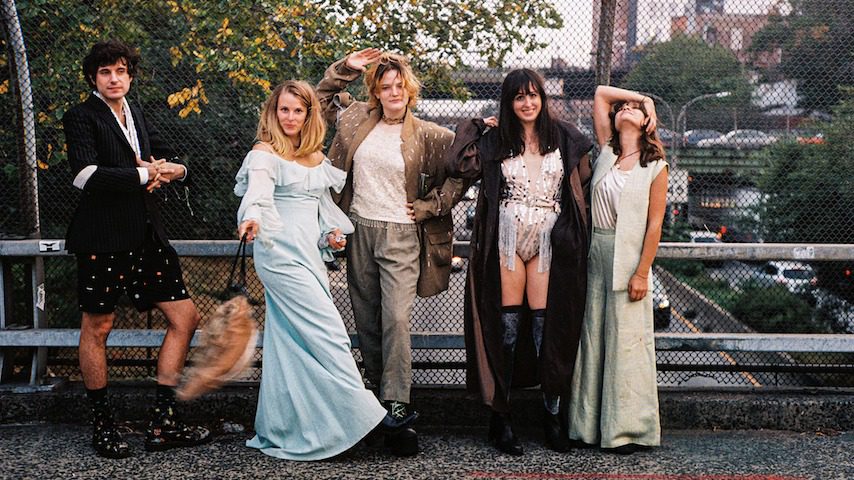2021’s first quarter comes to a close this week, and with the various COVID-19 vaccines gradually making their way through the population, the short-term future of music (and, you know, humanity) is looking brighter than it has in a hot minute. The recent past has been kind to avid listeners regardless, with March standing out as perhaps the single most stacked music month of the year so far. We were blown away by the intergenerational collaboration between electronic producer Floating Points and jazz titan Pharoah Sanders, surprised and stung by the Graceful Rage of Philadelphia’s Harmony Woods, and impressed by the debuts of Floatie, Genesis Owusu and others. From our many spreadsheets to your eyeballs, here are the best albums of March 2021, as painstakingly selected by the Paste Music team.
Arab Strap: As Days Get Dark
The seventh studio album from Scottish rock duo Arab Strap—the first since 2005’s The Last Romance, not to mention their breakup the following year—As Days Get Dark finds Aidan Moffat and Malcolm Middleton reuniting to make music that braves new sonic territory while remaining true to the band’s ‘90s/’00s output. The result is a sparse, yet sprawling album “about hopelessness and darkness, but in a fun way,” as Moffat puts it. “Dark” is simply unavoidable as a descriptor for this record, a drum machine-driven, synth-studded exploration of where human beings turn for comfort in bleak times. Producer Paul Savage, with whom Arab Strap collaborated on their first, second and sixth albums, returns for As Days Get Dark, assisting the duo in wrangling the record’s many jazz, post-rock and electronic flourishes. Moffat’s signature Sprechgesang vocal delivery, in particular, gives Arab Strap’s comeback an of-the-moment feel, as do his erudite, blackly comic, frequently horny lyrics—these are songs like short stories, well-worth getting lost in, as engrossing as they are ominous. —Scott Russell
Fake Fruit: Fake Fruit
Post-punk lovers have a new act to follow in Fake Fruit, a Vancouver-bred, Bay Area-based quartet whose self-titled debut is out now on Rocks In Your Head Records. The band cite Pink Flag-era Wire, Pylon and Mazzy Star as influences, and Fake Fruit bears that synthesis out: You’ll find the first two acts’ versatile, hard-edged, bright- and fast-burning guitar rock (“Old Skin,” “Yolk”), as well as the last one’s engrossing quiet-loud dynamics (“Stroke My Ego”). But that specific stylistic fusion is only a jumping-off point: “Keep You” finds singer and guitarist Hannah D’Amato’s melodic vocals overlaying hypnotic shoegaze guitars (courtesy of Alex Post on lead) and a clattering low end (Martin Miller on bass, Miles MacDiarmid on drums), while album closer “Milkman” finds D’Amato sharing vocal duties over deft guitar harmonics and a motorik backbeat. And an X factor in all this is Fake Fruit’s mordant lyricism: “My dog speaks more than you did tonight,” D’Amato sneers on “Keep You,” a laugh line on an album that shows serious potential. —Scott Russell
Floatie: Voyage Out
Chicago quartet Floatie make brain-wrinkling rock that wouldn’t be possible without their close interconnection. Though Sam Bern, Luc Schutz, Joe Olson and Will Wisniewski have only just released their debut album on Exploding in Sound, Voyage Out is the product of a creative relationship that dates back nearly a decade, lending the band’s introductory effort a hard-won unity of vision you rarely see on a debut album, with Floatie writing and performing as one. There’s math-rock precision aplenty here—like on the arpeggiated riffage of “In the Night,” the elusive time signatures of “Lookfar,” or the title track’s dueling guitars—but where that kind of calculated instrumentation can sometimes feel sterile and joyless, Floatie’s is rich in emotional texture, specifically a dream-pop softness that provides a critical counterbalance to their meticulous constructions. Lead single “Catch a Good Worm” finds both these elements colliding to sublime effect, with pinpoint shifts between math chug and dreamy sludge as Bern imagines “A pretty worm, alive inside / Another name, another try.” —Scott Russell
Floating Points, Pharoah Sanders & The London Symphony Orchestra: Promises
This unlikely pairing of British electronic wiz Sam Shepherd, aka Floating Points, and free-jazz saxophone titan Pharoah Sanders is among the most revelatory match-ups in recent memory. On their long-simmering album Promises, which also features the cinematic swells of the London Symphony Orchestra, the musicians’ collaborative energy proves as remarkably potent as it is improbable. Unfurling in one continuous, wordless composition split into nine movements, Promises sounds like a leap of creative faith, a cosmic communion that reaches across generations, genres and musical barriers to build something beautiful. When played without interruption and afforded the patience (and quality speakers) it demands, Promises is the kind of album that can rearrange the molecules in a room. It can imbue your drab apartment with a vast, cinematic weight. It can kill a party (this is admittedly speculative) in the best possible way. It can fill up the space while you wash dishes, put away laundry or water plants, infusing any mind-numbing household activity with a mist of supernatural yearning. —Zach Schonfeld
Genesis Owusu: Smiling with No Teeth
Genre classifications can be a helpful shorthand when it comes to understanding and engaging with new music, but nowadays, more and more artists are leaving them entirely in the dust. Just take Ghana-born, Australia-based musician Genesis Owusu, whose thrilling debut record Smiling with No Teeth is consistently difficult to pin down in a way that feels nothing less than vital. The avant-garde, yet undeniably accessible album spans glitchy, Death Grips-esque electro-hip-hop, lush dark-pop and R&B, lusty synth-funk and new-wave rock, with Owusu as the charismatic presence in the eye of the stylistic cyclone. On lead single “Gold Chains” and the album as a whole, Owusu exposes “the flaws of being in a profession where, more and more, you have to be the product, rather than just the provider of the product,” emphasizing the human being under all that gold, whose peace of mind may be the price he pays. —Scott Russell
Harmony Woods: Graceful Rage
Philadelphia’s Harmony Woods surprise-released a new album, Graceful Rage, on March 12. Produced by Bartees Strange, the newest LP follows 2019’s Make Yourself at Home. Power courses through Harmony Woods’ latest creation, an album that songwriter Sofia Verbilla describes in a statement as “a record about confronting the emotional rubble that this trauma leaves in its wake.” Verbilla lyrically explores the great disappointment of having a personal idol fall from grace in your mind’s eye, and the rush of emotions that follows. Standout tracks include the haunting and raw ballad “Easy,” which opens with chamber choir-esque layered vocalizations from Verbilla. The impassioned pop-punk of “God’s Gift to Women” is particularly scathing, with notable one-liners like “You’re not the person the world person the world pretends you are” and “I watch the skeletons fall / This is your wrecking ball.” Potent and gripping, Graceful Rage is an apt name for a record that so masterfully turns Verbilla’s bitterness into a work of art. —Carli Scolforo
Jane Inc.: Number One
Jane Inc., the solo project of Toronto’s Carlyn Bezic, made her ‘80s-infused debut on her new album Number One. The LP offers eight tracks of synth-heavy and experimental indie pop. Standout moments range from the dreamy, fuzzy textures of “Gem” and “Obliterated” to the harder edges of “Steel,” on which dissonant harmonies give a slightly eerie coloring to the track. While Bezic is no stranger to the music business, lending her talents to projects like Ice Cream, Darlene Shrugg and the touring lineup of U.S. Girls, Number One is a standout showing of the artist’s promise as a solo act. —Carli Scolforo
New Pagans: The Seed, The Vessel, The Roots and All
The Seed, The Vessel, The Roots And All, the highly anticipated full-length debut by New Pagans, finally arrived on March 19. The Belfast band’s biting, noisy and raw brand of post-punk is inspired, striking an impressive balance between biting wit and an understated sweetness. This symmetry can be marked in single “Yellow Room,” as frontwoman Lyndsey McDougall effortlessly flows from pleasant verses into powerful, anthemic choruses and a snarling breakdown. The song lyrically takes inspiration from the iconic feminist novella The Yellow Wallpaper by Charlotte Perkins Gilman, and pulls from McDougall’s experiences feeling silenced as a new mother, advocating for an increase in parent-and-baby mental health programs in Northern Ireland. —Carli Scolforo
serpentwithfeet: DEACON
On DEACON, serpentwithfeet presents Black queer love and joy more as a series of little everyday moments than an all-consuming, mystical force. While vivid details and a Black queer foundation are nothing new for the Ty Dolla $ign and Björk collaborator—on “fragrant,” from his 2018 debut LP soil, he recalled asking all of his ex’s exes one by one to kiss him—the presence of unbridled joy and love on his sophomore album is a striking sea change. Where serpent mourned fizzling loves on soil and debut EP blisters, here, he hails the simple glories and everyday little moments of thriving Black queer romances. His perspective, though a stretch to read as some sort of overt or grand political statement, is a beaming needle in the ever-cluttered, often redundant haystack of romantic music. —Max Freedman
Valerie June: The Moon And Stars: Prescriptions For Dreamers
On her new album The Moon and Stars: Prescriptions for Dreamers, we find Valerie June where we last left her: dancing among celestial bodies most of us could only dream of touching. But this time she seems to have answered the question “Is there a light?” firmly for herself. There is light—so much of it—and June, with help from former Kendrick Lamar producer Jack Splash, seems determined to scatter that light as far and wide as humanly possible. Splash’s hip-hop sensibilities combined with June’s breezy soul create an otherworldly effect. The Moon and Stars is where soul and folk and country and Afrobeats meet up for an aerial dance through a planetarium, La La Land-style. Gospel and rock weave in and out of this music, too, but still leaving room for June’s reggae spirit. The best example of her worry-free style is on “Smile,” the record’s jubilant centerpiece. “I dust it off / I get back up,” she confidently sings. Bolstered by a cheerful guitar and snappy keys, “Smile” is more than a happy-go-lucky anthem—it’s a display of Black perseverance. —Ellen Johnson




